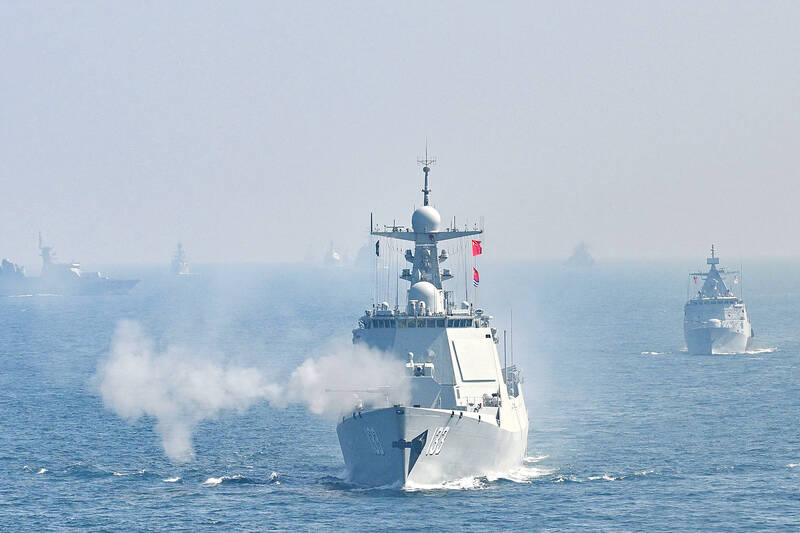Beijing yesterday warned Canberra of potential “live fire” naval drills in international waters off Australia’s eastern coast, Australian Prime Minister Anthony Albanese said, as commercial flights were told to steer clear of the area.
Beijing described the maneuvers as training exercises that were “safe, standard and professional,” and in line with international law, without commenting on whether live ammunition was used.
The Australian Department of Defence has been monitoring the Chinese navy vessels — a frigate, a cruiser and a supply tanker — since they were spotted last week.

Photo: AFP
Albanese said the fleet had yesterday alerted Australian officials that it might start conducting live-fire drills, and that ships and planes should steer clear.
“This is activity that has occurred in waters consistent with international law,” Albanese said. “There has been no imminent risk of danger to any Australian assets or New Zealand assets, and that’s why this notification occurs.”
Asked about the drills yesterday, the Chinese Ministry of Foreign Affairs said the military had “organized a naval formation to conduct training and exercises in distant waters.”
“The exercises were conducted in a safe, standard and professional manner at all times, in accordance with relevant international laws and practices,” ministry spokesman Guo Jiakun (郭嘉昆) said at a regular news conference.
Australian Minister for Foreign Affairs Penny Wong (黃英賢) earlier had voiced concern over the exercises.
“We will be discussing this with the Chinese,” she told national broadcaster ABC from Johannesburg, South Africa, where she was attending a G20 meeting.
Australia’s air safety agency warned commercial flights to alter course after receiving “reports of live firing in international waters.”
“As a precaution, we have advised airlines with flights planned in the area,” Airservices Australia said in a statement. “We are also working together to coordinate advice to operators and pilots.”
Qantas and its subsidiary budget airline Jetstar temporarily adjusted some flights between Australia and New Zealand, industry sources said.
Virgin Australia was also heeding the advice, while Air New Zealand said it had “modified flight paths as needed to avoid the area.”
Although the ships were sailing in international waters, Australian Minister for Defence Richard Marles described their presence as “unusual.”
“We are keeping a close watch on them, and we will make sure we are watching every move,” he told Sky News on Thursday. “It’s not unprecedented, but it is an unusual event.”
The ships were reportedly within 150 nautical miles (280km) of Australia’s mainland earlier this week.
Canberra rebuked Beijing last week for “unsafe” military conduct, accusing a Chinese fighter jet of dropping flares near an Australian air force plane patrolling the South China Sea.
Beijing swiftly hit back, accusing the Australian plane of “violating Chinese sovereignty and endangering Chinese national security.”

‘TAIWAN-FRIENDLY’: The last time the Web site fact sheet removed the lines on the US not supporting Taiwanese independence was during the Biden administration in 2022 The US Department of State has removed a statement on its Web site that it does not support Taiwanese independence, among changes that the Taiwanese government praised yesterday as supporting Taiwan. The Taiwan-US relations fact sheet, produced by the department’s Bureau of East Asian and Pacific Affairs, previously stated that the US opposes “any unilateral changes to the status quo from either side; we do not support Taiwan independence; and we expect cross-strait differences to be resolved by peaceful means.” In the updated version published on Thursday, the line stating that the US does not support Taiwanese independence had been removed. The updated

‘CORRECT IDENTIFICATION’: Beginning in May, Taiwanese married to Japanese can register their home country as Taiwan in their spouse’s family record, ‘Nikkei Asia’ said The government yesterday thanked Japan for revising rules that would allow Taiwanese nationals married to Japanese citizens to list their home country as “Taiwan” in the official family record database. At present, Taiwanese have to select “China.” Minister of Foreign Affairs Lin Chia-lung (林佳龍) said the new rule, set to be implemented in May, would now “correctly” identify Taiwanese in Japan and help protect their rights, the Ministry of Foreign Affairs said in a statement. The statement was released after Nikkei Asia reported the new policy earlier yesterday. The name and nationality of a non-Japanese person marrying a Japanese national is added to the

AT RISK: The council reiterated that people should seriously consider the necessity of visiting China, after Beijing passed 22 guidelines to punish ‘die-hard’ separatists The Mainland Affairs Council (MAC) has since Jan. 1 last year received 65 petitions regarding Taiwanese who were interrogated or detained in China, MAC Minister Chiu Chui-cheng (邱垂正) said yesterday. Fifty-two either went missing or had their personal freedoms restricted, with some put in criminal detention, while 13 were interrogated and temporarily detained, he said in a radio interview. On June 21 last year, China announced 22 guidelines to punish “die-hard Taiwanese independence separatists,” allowing Chinese courts to try people in absentia. The guidelines are uncivilized and inhumane, allowing Beijing to seize assets and issue the death penalty, with no regard for potential

‘UNITED FRONT’ FRONTS: Barring contact with Huaqiao and Jinan universities is needed to stop China targeting Taiwanese students, the education minister said Taiwan has blacklisted two Chinese universities from conducting academic exchange programs in the nation after reports that the institutes are arms of Beijing’s United Front Work Department, Minister of Education Cheng Ying-yao (鄭英耀) said in an exclusive interview with the Chinese-language Liberty Times (the Taipei Times’ sister paper) published yesterday. China’s Huaqiao University in Xiamen and Quanzhou, as well as Jinan University in Guangzhou, which have 600 and 1,500 Taiwanese on their rolls respectively, are under direct control of the Chinese government’s political warfare branch, Cheng said, citing reports by national security officials. A comprehensive ban on Taiwanese institutions collaborating or